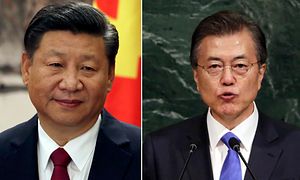South Korean President Moon Jae-in will visit China next week for a state visit, the South Korean government announced this week. Moon will arrive in Beijing on December 13 for a four-day visit. In what will be his first visit to Beijing, Moon will meet with his Chinese counterpart Xi Jinping to discuss their bilateral relationship and issues of regional concern, including North Korea’s rapidly developing ballistic missile and nuclear weapons programs.
Moon’s visit will also mark another step in a thaw between China and South Korea following more than a year of unofficial Chinese sanctions against Seoul for its decision in 2016 to host the U.S.-operated Terminal High Altitude Area Defense (THAAD) system on its territory. Beijing sees the powerful radar system accompanying the THAAD missile defense system as a threat to its own national interest.
The warming of ties between the two countries follows an understanding that both their foreign ministries announced in late October over the THAAD dispute. In exchange for reassurances from South Korea that it would not acquiesce to additional U.S. ballistic missile defense deployments and would refrain from participating in any regional U.S. ballistic missile defense program in the future, Beijing agreed to restore normal diplomatic ties, end its unofficial economic sanctions against South Korean entities, and pursue rapprochement with Seoul.
For the Moon government, China is an important partner. Shortly after his election in May, Moon reached out to Xi to discuss the threat posed by North Korea. Just days after Moon took office, North Korea carried out its first successful test launch of the Hwasong-12 intermediate-range ballistic missile, the system that would turn out in July to be the basis for North Korea’s first successfully flight-tested intercontinental-range ballistic missile (ICBM), the Hwasong-14. Now, as Moon prepares for his visit to China next week, North Korea has just introduced yet another ICBM, the Hwasong-15 — its largest ballistic missile tested to date.
Moon’s visit will follow a rare high-profile visit by the top United Nations official for political affairs, Jeffrey Feltman, to Pyongyang. Feltman, who is in North Korea this week, is expected to meet senior North Korean officials, including North Korean Foreign Minister Ri Yong-ho. Feltman will not meet Kim Jong-un, but his trip is seen as an attempt by the United Nations to help reduce the temperature on the Korean Peninsula, particularly as both the North Korean regime and the Trump administration in the United States exchange threats.
Beyond North Korea, Moon’s agenda in Beijing will be expansive, focusing on bilateral trade and investment ties with China in addition to other issues of regional concern. Following the bilateral understanding in October, the two countries had issued a joint statement that acknowledged their relationship as having “great importance.”
“Both sides agreed that strengthening exchanges and cooperation between Korea and China would create harmony of interests in both sides, and agreed to resume exchanges and cooperation in all areas as soon as possible,” they noted.
































